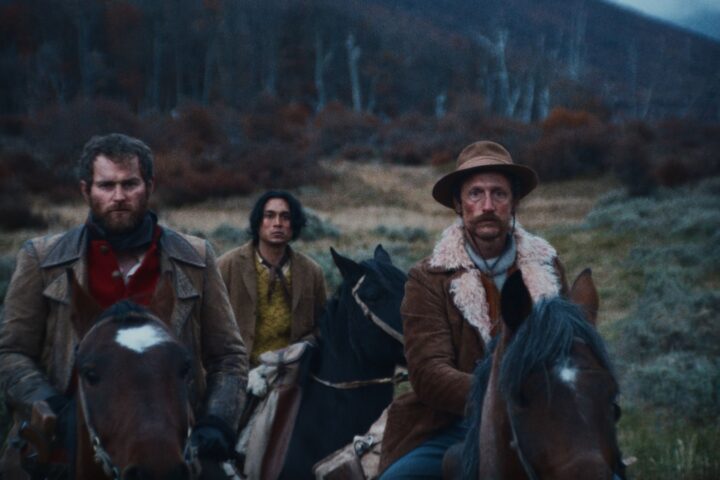The early 21st century has proved to be a flashpoint for trans visibility and rights, but what’s too often lost amid our moment’s mix of jubilation and strife is that interwar Europe was another flashpoint. That was when, as Paul B. Preciado points out in Orlando, My Political Biography, trailblazing psychologist Magnus Hirschfeld began advocating for trans rights and Virginia Woolf published her gender-bending novel Orlando: A Biography. In his documentary, Preciado draws a long, winding connection between Woolf’s epoch of change and our own, because, as he asserts in his voiceover narration, “the world today is full of Orlandos.”
Drawing from Woolf but more in tune with Godard and deconstruction than high literary modernism, My Political Biography can be both heartfelt and tedious. Preciado’s interlacing of the personal, the interpersonal, and the political is intricate and evocative in ways that often belie his no-spectacle staging and no-frills camerawork. Even so, the film’s pointed disregard for straight filmmaking tends more toward academic discourse than rambunctious subversion.
The main character of Woolf’s novel, the English nobleman Orlando, not only remains inexplicably youthful through over three centuries of British history, but also changes genders, equally without explanation. For Woolf, this was both a way of exploring the arbitrariness of gendered strictures and a means of asserting that the future is female—as anyone who’s familiar with Sally Potter’s ravishing, Tilda Swinton-starring adaptation of Orlando may well remember.
Orlando is thus not precisely trans, but to Preciado and other trans readers of the last several decades, the character was one of the few thoroughly canonized instances of gender non-binarism. Unlike real-world trans people, Orlando was also one of a kind, a singular magical-realist stand-in for the turbulence and triumph of British history. “Contrary to what you imagined, Virginia,” Preciado chastises at one point, “Orlando was not alone.”

Though the opening titles claim that what we’re watching has been “freely adapted” from Woolf’s novel, My Political Biography languishes in an undefinable interstitial space, floating between fiction and essay film. It brings in members of French trans communities, ostensibly to act out scenes from the book, but has each of them step in and out of character, intermingling their own stories with Woolf’s nine-decade-old rendition of non-binarism. The scenes performed are thus at once adaptation and commentary, and this indefinability has clear thematic resonance. That is, the film is “non-binary” in more than one sense.
Preciado’s musings, delivered in a raspy, low tone that recalls Godard’s own narration for his films, leads us through the labyrinth that trans people have to navigate as they struggle for recognition, legitimation, and historical traces of their existence. His film is subtitled My Political Biography, riffing on the misleading subtitle of Woolf’s novel. Preciado’s film isn’t solely his biography, but rather composes a fluctuating unity out of multiplicity. Given how many people tell their stories here, the reference of the “my” is ambiguous and unstable.
The heartening confrontations between the real people, with their multiple iterations of trans identity, and the work of fiction that imperfectly allegorized their experiences comes off as this clever film’s deftest stroke. Against the soundstage backdrop where he’s to play the young courtier Orlando, a teenaged trans boy discusses the same kind of uncertainties most young men have about performances of masculinity. Elsewhere, the boundaries between fiction and reality become even more porous as one interviewee/actor suggests that they were prescribed the medieval remedy of peasant gall for their misdiagnosed gender dysphoria.
My Political Biography rigorously outlines and sometimes gets a bit lost in this complex web of performance, textuality, corporeality, and the ways each of these are both gendered and political. Zeroed in on the ways its own conceit speaks to certain elements of the trans experience, Preciado’s almost epigrammatic narration can wax a bit too cute. “To be trans,” the filmmaker intones as one of his actors mutedly pokes around a ship constructed on a soundstage, “is to discover the backstage of sexual and gender difference.” True, no doubt, but perhaps one advantage of Woolf’s novel, however proscribed its perspective may be, would be that the reader comes away not only knowing this, but also feeling it.
Still, one can hardly deny the thoroughness or multidimensionality with which Preciado examines the points of contact and tension between Woolf’s novel, with its themes of gender mutability and historical upheaval, and the actual experiences of being trans. Woolf, a powerful intellect whose father was a renowned historian, knew perhaps better than most people that history gives the lie to any insistence that men and women are always one thing or the other. Most cisgender people, that is. As Preciado’s Orlando, My Political Biography drives home, trans and non-binary people live in that Orlandean knowledge daily.
Since 2001, we've brought you uncompromising, candid takes on the world of film, music, television, video games, theater, and more. Independently owned and operated publications like Slant have been hit hard in recent years, but we’re committed to keeping our content free and accessible—meaning no paywalls or fees.
If you like what we do, please consider subscribing to our Patreon or making a donation.





